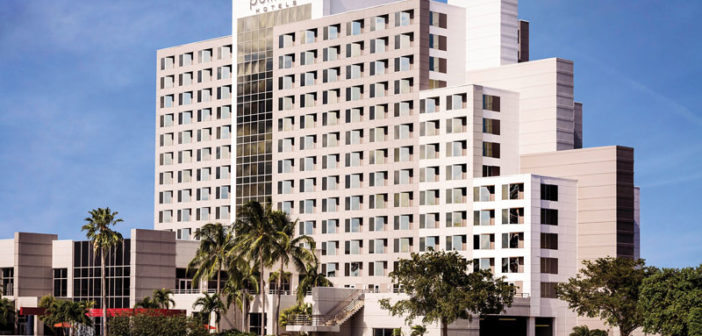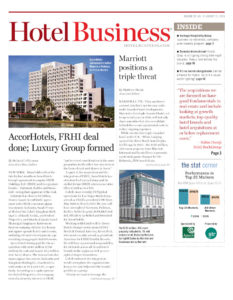NEW YORK—Shareholders blew the ink dry last month on AccorHotels Group’s agreement to acquire FRHI Holdings Ltd. (FRHI) and its signature brands—Fairmont, Raffles and Swissôtel—voting their approval of the deal.
Estimated at close to $3 billion, France-based AccorHotels’ agreement with FRHI’s investors Qatar Investment Authority, Saudi Prince al-Waleed bin Talal’s Kingdom Holding Co. of Saudi Arabia, and Oxford Properties, an Ontario, Canada-based Municipal Employees Retirement System company, delivers 154 luxury and upper-upscale hotels and resorts, including 40 under development, representing an aggregate 56,000 rooms.
AccorHotels Group paid for the acquisition with $840 million (€768 million) in cash and issued 46.7 million new Accor shares. The transaction also makes Qatar Investment Authority and Kingdom Holding Co. shareholders, with stakes at 10.4 and 5.8%, respectively. According to a spokesperson for Oxford Properties, the company owned a minority interest in FRHI “and received consideration in the same proportion to the other two investors in the form of cash and shares in Accor.”
As part of the acquisition and the integration of FRHI, AccorHotels has structured a Luxury Group and installed former FRHI veteran executive Chris Cahill as its CEO.
Cahill, most recently EVP/global operations for Las Vegas Sands Corp., served as FRHI’s president/COO from May 1993 to March 2012. He now will have oversight of Fairmont, Pullman, Raffles, Sofitel Legend, SO Sofitel, Sofitel, MGallery by Sofitel and Swissôtel for AccorHotels.
Working with Cahill will be AccorHotels Group’s newly named COO/North & Central America, Kevin Frid, who most recently served as president/Americas for FRHI Hotel & Resorts. He will have operational responsibility for 88 hotels across all AccorHotels’ brands in the region as well as oversight of major renovations.
Cahill indicated the integration would strengthen the organization’s luxury tier and help raise the brands’ profiles as a group.
“Clearly we want to leverage the experience of the Fairmont organization, particularly when it comes to the meetings market; there’s a long-standing reputation. There’s also a lot of expertise both from a sales and distribution standpoint in terms of attracting business and in [delivering]service,” he said. “One thing we are focused on—call it best practices—is the skill set, the experience, policies and guidelines in terms of delivery into the broader Accor organization. With the Pullman brand, for example, and with Sofitel, we do have a lot of meetings capacity and capabilities, and with the global sales force that they have, we can use that to our advantage and help leverage the relationship generally across the entire portfolio.
“This is different than a lot of M&As that have gone on. This isn’t a company just being folded in; this is being added on,” emphasized Frid.
Globally, AccorHotels has close to 4,000 hotels representing some 500,000 rooms that run the gamut from economy to luxury under a variety of brands (14 hotels, two aparthotels), such as Sofitel, Novotel, Pullman, Mercure and Ibis. It currently has almost 500 luxury and upscale properties.
FRHI’s hotels and resorts span 34 countries across five continents. It has 42 properties in North America, two in South America, 26 in Europe, 17 in Africa/Middle East and 28 in Asia-Pacific. The majority of hotels are operated under long-term management contracts; six hotels are leased and one is owned.
The company’s portfolio includes such iconic properties as Raffles Singapore, The Savoy in London, Shanghai’s Fairmont Peace Hotel, The Plaza Hotel in New York, Le Royal Monceau-Raffles Paris, Fairmont San Francisco, Fairmont Le Château Frontenac in Quebec, Swissôtel Chicago and Swissôtel The Stamford in Singapore.
“The opportunity for FRHI is we were a small company and, suddenly, there’s this significant platform of resources, distribution channels, etc., to take advantage of that we never had before. That’s where the opportunity lies,” said Frid.
While concern for market overlap has surrounded other M&As, Cahill expressed confidence there was scant redundancy in this deal that would cause issues with guests or owners. “Where we do have a Sofitel, for example, or a Fairmont in the same market, they’re not sitting across the street from each other or geographically that close. When you look at the hierarchy of brands starting with the Luxury Group, the brands are uniquely different in terms of their appeal within that luxury category that we don’t see much overlap at all from a development standpoint or growing them,” he said. “Likewise, when you move into the upper-upscale category—Pullman, Swissôtel, MGallery—again, very distinct brands in their own way and not much overlap. We see actually great opportunities to grow all these brands before we run into any kind of concerns over ‘competitiveness’ [among]them.”
While AccorHotels last year brought its Pullman brand to the United States, reflagging an existing Sofitel in Miami for the debut property, several of its brands, including MGallery, SO Sofitel, Sofitel Legend and Ibis, are not present domestically. Similarly, FRHI’s Raffles remains outside North and South America. Under the restructured company, that may change over the long term.
“Adding a Raffles in New York is very important to us, as are the other major gateway cities,” said Frid. “There’s also tremendous opportunity to grow Fairmont and you can keep going through the brands in that way.”
Cahill indicated growing more-established brands would likely be the initial effort.
“Let’s take, for example, the MGallery brand, which is more of a lifestyle brand. Putting all our time and attention against that to add one property is probably not the highest and best use of resources. It would take a lot more time, whereas you have a very established Fairmont brand in North America, albeit in a different tier, but that’s going to be an easier one to continue to develop,” he said. “We have a few Pullmans in North America; that would be a good brand to pursue in the upper-upscale category. If we got the opportunity to add more Swissôtels, we’d add those. All brands, if you will, are a priority.”
Cahill noted adding a few same-brand hotels as part of an opportunity against doing one-offs to get a brand foothold was an obvious preference.
Frid observed AccorHotels’ Ibis brand, for example, has experienced “tremendous growth in a short time” in Mexico, mirroring the success the brand has had in South America. “That brand undoubtedly—and I can see it in the pipeline—will continue to have significant growth in Mexico, whereas in the United States, we’d like to focus more on growing Fairmont in some of the key gateway cities we’re not in yet. So it’s very much almost country by country, looking for the greatest opportunity for the brands,” he said.
Projects ahead include Fairmont Austin, a $350-million concept set to open next year that will provide direct access to the Austin Convention Center; the new 250-key Fairmont Costa Canuva hotel with private residences along the Riviera Nayarit in Mexico (opening 2018); and the 290-room Sofitel Mexico Reforma slated to open in 2018.
Enhancing the portfolio via renovations also is a key strategy, such as the recent $75-million restoration of the Fairmont Le Château Frontenac in Quebec City and the multimillion-dollar guestroom renovation at Seattle’s historic 450-room Fairmont Olympic Hotel. The Sofitel Washington DC at Lafayette Square is set to revamp its food and beverage outlets following the first phase of a renovation of all 237 guestrooms and meeting spaces, and a lobby redesign. Other major restoration projects include Toronto’s Fairmont Royal York, Fairmont Washington, D.C., and Montreal’s Fairmont The Queen Elizabeth.
Cahill noted while FRHI has grown largely through management contracts, AccorHotels has a large portfolio of real estate. “We’re not shy on real estate, but I think, generally speaking, when it comes to our brands we tend to want to have management agreements on the Luxury Group. But we’re not opposed to providing some kind of support investment if it’s the right strategic opportunity for the brand,” he said.
Frid added one growth opportunity is via mixed-use projects, which Cahill agreed is supported by AccorHotels.
“One of the things that’s a great asset in the context of the acquisition is their expertise on residential development. They have a large number in their current and under-development portfolio that have a component of mixed-use, primarily residential. And when you’re dealing with luxury hotels these days, and to some extent, upper-upscale, being able to have this mixed-use complex helps the economics tremendously,” said Cahill. “Fairmont, in particular, and the FHRI group have developed quite a good expertise in residential development and it’s something we intend to take advantage of as we look at opportunities around the world.” HB




